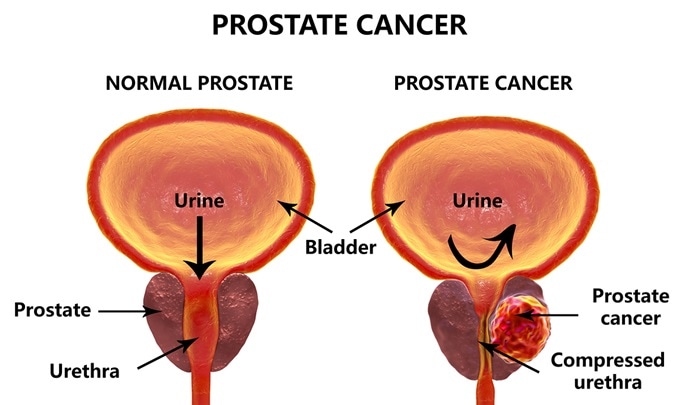British Prime Minister Theresa May has declared war against prostate cancer. Yearly, 47,000 men are UK are diagnosed with this cancer and 11,000 succumb to it, according to reports. Recent reports show that prostate cancer in men kills more than breast cancer does in women.
Prostate cancer has become the third common cancer in the UK. A report from a charity Orchid shows that a quarter of prostate cancer patients come in to the emergency late into their cancer. May is to announce £75m in research to fight this cancer.

Prostate cancer, 3D illustration showing normal prostate gland and presence of tumor inside prostate gland which compresses urethra. Kateryna Kon / Shutterstock
The funds would go into recruitment of nearly 40,000 men into clinical trials that test for better diagnostic tests for prostate cancer and also better treatment schedules and drugs to combat this disease. Reports have shown that prostate cancer diagnosis and treatment is largely neglected and lack of awareness among the public regarding the symptoms and progression of this cancer means that cancers are detected late. In more advanced stages the cancer is more difficult to treat and this raises the mortality caused by this cancer.
May before a visit to a Cambridgeshire hospital where she would make the announcement on Tuesday says, “Too many people endure the loss of a loved one because cancer diagnosis comes too late in the day… Our cancer treatments are world-class and survival rates are at a record high, but prostate cancer still claims thousands of lives every year. I know we can do more. That’s why I am setting out new plans to help thousands of men get treated earlier and faster.”
Prostate cancer is typically a slow growing tumour and this means that it is less likely to be detected early. However some men may have a type of prostate cancer that may progress rapidly. The difficulty lies in detecting the rate of progress of the cancer early on. Blood is usually tested for PSA (prostate-specific antigen) level. But this is not diagnostic in all men. In many men “watchful waiting” is advised to see how the cancer progresses.
.jpg)
Prostate cancer cells, SEM, illustration. Image Credit: royaltystockphoto.com / Shutterstock
Prof Mark Emberton from University College Hospital in London who specializes in this cancer said, PSA followed by a prostate biopsy may not be the correct diagnostic approach to detect men at higher risk. MRI scans he said, after the blood tests could be better predictors of the aggressive nature of the cancer.
The latest funds that would come into prostate cancer research would be moved via National Institute for Health Research clinical research network. Chief executive Dr Jonathan Sheffield says that the NIHR would work in collaboration with the NHS as well as charities, other sponsors as well as pharmaceutical industry to include 40,000 men in clinical trials over the next five years. “This will provide more opportunities for earlier access to new drugs and therapies, which will ultimately lead to improved diagnoses and care in the future,” he said.
This week, when the funding is being announced is marked as the Male Cancer Awareness Week.